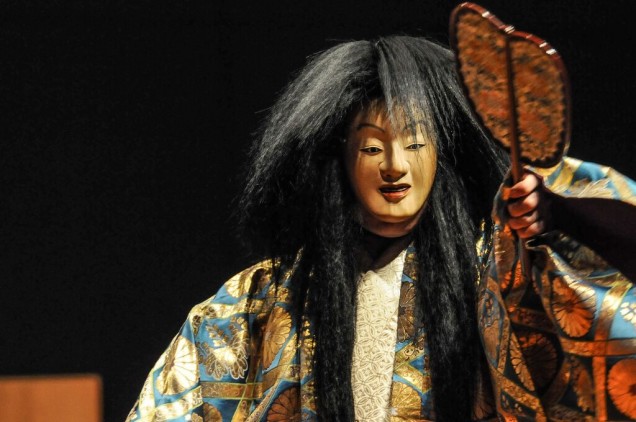Theatre Nohgaku – March 25-31, 2016
 The BU Arts Initiative-Office of the Provost, the Women’s, Gender, & Sexuality Studies Program, the Center for the Study of Asia, and the CAS Department of English will host a five-day residency with Theatre Nohgaku.
The BU Arts Initiative-Office of the Provost, the Women’s, Gender, & Sexuality Studies Program, the Center for the Study of Asia, and the CAS Department of English will host a five-day residency with Theatre Nohgaku.
Theatre Nohgaku is an international performance group devoted to sharing the beauty and power of the classical Japanese noh drama with English speaking audiences and performers. Noh, one of the oldest continuing stage arts, combines highly stylized dance, chant, music, mask, and costume with intense inner concentration and physical discipline. Theater Nohgaku performs traditional noh in Japanese and English translation and creates original works that combine noh’s performance techniques and modes of expression with twenty-first century concerns.
Schedule of Events
(All events listed below are free of charge)
Friday, March 25th
Noh Music Performance/Discussion: 12 – 1 p.m. / Studio 167 -College of Fine Arts, 855 Commonwealth Ave. / RSVP.
Hosted by Marié Abe, Assistant Professor – Musicology, Ethnomusicology
Noh Movement Workshop: 4 – 6 p.m. / Studio 109 – College of Fine Arts, 855 Commonwealth Ave.
(Space Limited – RSVP will open to the public in February if space is available)
Hosted by Tamala Bakkensen, Lecturer – Movement
Saturday, March 26th
Lecture and Demonstration of Noh and Kyogen Performance Styles: 2 – 3:30 p.m. / Concert Hall – College of Fine Arts, 855 Commonwealth Ave. / RSVP
Monday, March 28th
Playwriting Workshop – Noh Style: 7 – 9 p.m. / Boston Playwrights’ Theatre, 949 Commonwealth Ave. / RSVP.
Hosted by Jacob Strautmann, Lecturer & Kate Snodgrass, Professor of Practice
Wednesday, March 30th
Performance – Sumida River and Zahdi Dates and Poppies – with post performance panel discussion on Trauma & the Arts: 6:30 p.m. / Tsai Performance Center – 685 Commonwealth Ave. / RSVP. CC
Panelists include:
Emily Burkes-Nossiter, MA – Drama therapist & psychotherapist
Jaimie Gradus, DSc, MPH – Epidemiologist, Women’s Health Sciences Division, National Center for PTSD, Assistant Professor of Psychiatry at Boston University School of Medicine and Assistant Professor of Epidemiology Boston University School of Public Health.
Kenneth Harris – Recruiting Operations Officer, Military Science Department – BU Army ROTC
Ellen Healy, Ph.D. – Clinical Psychologist, Training and Education Coordinator, VA CPT Training Program, Women’s Health Sciences Division, National Center for PTSD.
Moderated by Carrie Preston, Ph.D. – Associate Professor, English Department – BU College of Arts & Sciences
Thursday, March 31st
Performance (High School) Zahdi Dates and Poppies: 10 a.m. / Tsai Performance Center – 685 Commonwealth Ave. / SOLD OUT
Performance – Sumida River and Zahdi Dates and Poppies: 7 p.m. / Tsai Performance Center – 685 Commonwealth Ave. / RSVP. CC
Zhadi Dates and Poppies Program
If you are interested in the process of developing Zahdi Dates and Poppies please check out the following blog posts from playwright Carrie Preston and Composer David Crandall, and check out the video below.
Finding the Dog – David Crandall
Finding the Dog in Noh, and Leaving it Alone – Carrie Preston
When there is No Dog – David Surtasky
Hair of the Dog, pt. 1 – David Crandall
Check out our longer video for more information: Making of Zahdi Dates & Poppies.
About the Plays
Zahdi Dates and Poppies (World Premiere) is a contemporary, masked, lyric, dance piece written by Carrie Preston, scored by David Crandall, and directed by Jubilith Moore in the noh style. This moving work adapts the poetic, musical, and performance styles of the ancient Japanese noh theater to explore a timeless concern: the impact of war on those who do the killing and their families. A US Marine fighter pilot is haunted by an insurgent he killed on a bombing raid in Zaidon, Iraq—a raid that also saved the life of a fellow Marine marksman. The pilot’s wife, despite her own deep antipathy to war, tries to support him as he struggles with the nightmares of combat trauma. Appearing in the pilot’s dreams, the ghost of the Iraqi insurgent mourns the loss of his life and the companionship of his own wife before achieving the release of forgiveness. While based on noh performance techniques, Zahdi Dates and Poppies expands the traditional idiom with flexible structure, innovative mask, costume and lighting design, and modified music and choreography that create a one-of-a-kind theatrical experience. Zahdi Dates and Poppies was developed with significant support from the Ko Festival.
Sumida River is an English-language translation and performance adaptation of Sumidagawa, one of the most popular and affecting pieces in the traditional noh repertory. Adapted and directed by Theatre Nohgaku’s Artistic Director Richard Emmert, it explores the deep bond between mother and child and the tragedy of loss. A ferryman on the Sumida River is about to take a traveler across, but they decide to wait for a madwoman following close behind. The woman arrives and tells how she is looking for her son who has been taken by slave traders. As they cross, they notice a crowd on the opposite bank conducting a Buddhist memorial service. The ferryman tells how a boy died a year earlier after having been left behind by slave traders. The woman realizes that the boy was her own son. The ferryman takes her to the grave. When she begins to recite prayers, the boy’s voice is heard from inside the grave. His ghost then appears to her but when she reaches out to touch him, he slips back into the grave and disappears, leaving only “sadness and sorrow.” This production features the main character in full noh costume and mask, and closely follows traditional performance practice to provide English-speaking audiences with an accessible glimpse into the world of noh, a stage art that has been continuously performed for more than 650 years.
Check out the full biographies of all our visiting artists with Theatre Nohgaku.

What Workshop Participants Have Said …
“…the discipline, density, meditative energy, and meta-human passions of the form and tradition are tremendously alluring. Writing under the influence of noh, schooled by it, magnifies possibilities. … Noh’s use of space and time is in perfect accord with experiment in the field. This research supports adventure at the vanguard.” – Erik Ehn, playwright at New Dramatists, Chair of Playwriting, Brown University
Press
“PAGODA is a triumph. To have created a new Noh play but retained total authenticity is nothing short of brilliant. It is something that devotees of Noh will savour.” – Liz Arratoon. The State (London)
What Audiences and Presenters Have Said …
“…the opportunity to experience traditional Japanese theater is a real treat.”
“I was particularly impressed with the blend [of] the English language with the noh style and cadence of speech…”
“…thrilling, beautiful, stylized, controlled [and] gorgeous…”